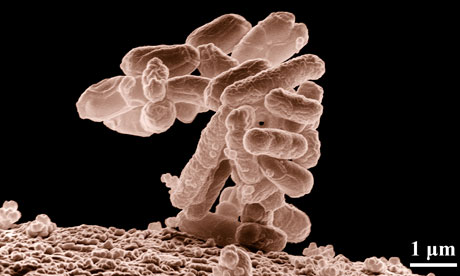Escherichia coli bacteria, methods of prevention of infection

The prevention of infection Escherichia coli
What can we do to protect ourselves and our families from Escherichia coli?
.....................................
Since there is no food safety program Safe, consumers should "drive defensively" as they navigate from the market to the table. It is no longer enough to take precautions only with ground beef and burgers, all swallowed by members of the family can be a vehicle of infection. Shiga E. toxin-producing E. coli are now so widespread that a wide variety of foods may be contaminated. direct animal-to-person transmission from person to person is uncommon. The following are the steps you can take to protect your family from E. coli. See also the section What is our government doing to protect us from E. coli?, then.
1- Meticulous personal hygiene practices. This is true not only for family members (and guests), but for any interface with the food supply chain. Remember that the bacteria E. coli are highly resistant (for example, can survive on surfaces for weeks) and only a few are sufficient to induce a serious illness. Since there is no practical way of monitoring the hygiene of food service workers, it is important to consult with local health departments to identify any restaurants that have given citations or warnings. The new practice of providing sanitation "report cards" for public display is a step in the right direction.
2-
Be cautious to keep away from cross contamination when preparing and cooking
food, if beef is being served. This requires being very mindful of the surfaces ( cutting boards) and the utensils used in the work of meal preparation that have come in contact with raw beef and other meats. This even means that utensils used to move raw meat to the cooking surfaces ought to not be the same that are later used to remove the cooked meat (or other foodstuffs) from the cooking surfaces.
3-Do not permit children to share bath water with someone who has any signs of diarrhea or �stomach flu�. And keep any toddlers still in diapers out of all bodies of water ( wading and swimming pools).
4- Do not let any relatives members touch or pet farm animals. Merely cleaning the hands with germ �killing� wipes may not be adequate!
5- Wear disposable gloves when changing the diapers of any child with any type of diarrhea. Keep in mind that E. coli O157:H7 diarrhea initially is non-bloody, but still very infectious. If gloves are not available, then thorough hand washing is a must.
6- Keep in mind that achieving a brown color when cooking hamburgers does not guarantee that E. coli bacteria have been killed. This is true for patties that have been frozen. Verifying a core temperature of at least 160 degrees Fahrenheit for at least 15 seconds is reliable. Small, disposable meat thermometers are available, a small investment compared to the medical expense (and grief) of infected member of the relatives.
7- Avoid drinking (and even playing in) any non-chlorinated water. There is an added risk if the water (well, irrigation water or creek/river) is close to, or downstream from any livestock.
Irradiation offers the most practical and effective sterilization of food and consumer protection. Already being used for poultry, and is approved for all other foods. Although the word "radiation" conjures up fears of radiation exposure, irradiated food does not become "radioactive", is safe and does not change the taste or texture of food. To ensure the safety of the public must be educated and the food industry convinced that this will not only protect consumers, but also positively influence its outcome. This should be a "cakewalk", given the fact that contaminated food are costing the food industry hundreds of millions of dollars a year (recently, a processing company beef was declared bankrupt following a massive recall of contaminated hamburgers). If this fails, the food industry may be required to implement this or other equally effective measures.

0 comments:
Post a Comment